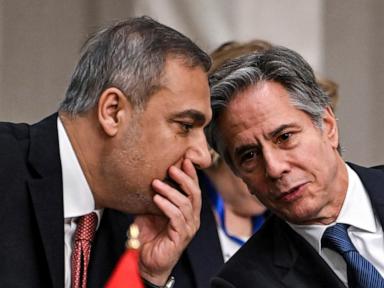No more nation-building: Step back from post-Assad Syria

The world was taken by surprise when rebels in Syria abruptly toppled Bashar al-Assad’s regime.
Those in the political and foreign policy establishment, who have long been advocating regime change, had reason to celebrate. Assad had been in their sights for more than a decade. Yet that same establishment is now wringing its hands over the question of “what next?” After all, their track record of rosy predictions after regime changes is spotty. For example, 13 years after Moammar Gaddafi was toppled, Libya is still embroiled in a civil war.
Certainly, the world should be happy to have one less brutal dictator, and the world should be happy for the Syrian people to have a chance at something better. Yet, despite Assad having fled to Russia, the U.S., Israel and Turkey continue to drop bombs on Syria. In a case of “be careful what you wish for,” these countries are apparently concerned about the rebels who have taken control of Syria — and Assad’s stockpile of chemical and other weapons falling into their hands.
The rebel coalition is led by Hayat Tahrir al-Sham, which is designated as a terrorist organization by the United States. The group’s leader is Abu Mohammad al-Jolani, who previously pledged his allegiance to al Qaeda and fought in the Iraqi insurgency against the American occupation. So concerns are not unfounded. However, both the group and its leaders have subsequently rebranded and cut ties with al Qaeda.
So far, Jolani’s words and actions have been promising. There is no talk of forming an Islamic state in the mold of the Taliban in Afghanistan. The rebels’ General Command announced on social media they would not impose religious dress code on women: "It is strictly forbidden to interfere with women's dress or impose any requests related to their clothing or appearance, including requests for modesty." Political prisoners jailed under Assad have been released. Conscripts in the Syrian military have been granted general amnesty.
What should the U.S. do?
To begin, it’s important to understand that Syria is not a threat to U.S. national security. In fact, even under Assad’s brutal rule, Syria was not a threat to U.S. national security because Assad did not have the military capability to attack the U.S. homeland. Furthermore, even though Assad supported Hezbollah, the Lebanese militant group never posed a global threat like al Qaeda, which carried out the 9/11 attacks.
First and foremost, the U.S. should remove the 900 troops it has in Syria. Ostensibly, they have been there for more than a decade to battle ISIS; yet ISIS in Syria is not a direct threat to the U.S. homeland, unlike al Qaeda in 2001. And to the extent ISIS poses a threat in the region, the countries in the region have the capacity and will to degrade ISIS.
Just as important, the U.S. needs to resist the temptation to meddle in Syria’s internal affairs and engage in any form of nation-building, democracy-building, or other form of social engineering. If there is an important lesson to be learned from 9/11, it is that unnecessary involvement in other peoples’ countries — especially in the Muslim world — is a recipe for fanning the flames of anti-American resentment that can eventually make the U.S. homeland a terrorist target.
Ultimately, America needs to be true to its principle of self-determination and respect the choices and will of the Syrian people as they move forward with rebuilding their country. While we may prefer they become a liberal democracy in the Western mold, that is not a requirement. Our only absolute requirement is that the new government not support or harbor any terrorist organizations with global reach and ambitions to attack the U.S. homeland.
Beyond that, our policy and message to Syria should simply be a wish for peace.
Charles V. Peña is a non-resident fellow at Defense Priorities. He has more than 30 years of experience as a policy and program analyst and senior manager, supporting both the Departments of Defense and Homeland Security. Peña is the former director of Defense Policy Studies at the Cato Institute and author of “Winning the Un-War: A New Strategy for the War on Terrorism.”
Topics
-

Post-Assad Syria is a critical first test for the Trump Doctrine
There is a perception that the Trump administration will disengage from Syria entirely, leaving a vacuum. However, I am less convinced. If Trump is committed to repairing the mistakes from the ...The Hill - 5h -
Al-Assad denies planned departure from Syria in alleged statement
Yahoo News - 9h -

Here's what to know about the US push for stability in post-Assad Syria
Secretary of State Antony Blinken has wrapped up perhaps his last Middle East mission as America’s top diplomatABC News - 1d -
Syria's Post-Assad Vacuum Has Become a Shooting Range for Great Powers
The U.S., Turkey and Israel are all pursuing long-held ambitions in the country after Assad’s ouster weakened Iranian and Russian influence.The Wall Street Journal - 5d -

Israel Says It Destroyed Syria’s Navy, Part of Wave of Post-Assad Attacks
Israel says it is striking Syrian military sites to keep them out of “the hands of extremists.” The rebels who toppled the Assad government began laying out their plans while rival groups fought ...The New York Times - 5d -

Pentagon chief: ‘Everybody expected’ stiffer resistance from Assad in Syria
Defense Secretary Lloyd Austin said the international community was expecting Syrian President Bashar Assad to have a stronger response to the rebels that took control of Damascus over the weekend. ...The Hill - Dec. 9 -

From doctor to brutal dictator: the rise and fall of Syria’s Bashar al-Assad
Toppled president came to power keen to show he was different from his father but proved to be as repressive. Middle East crisis – live updates On the face of it at least, the Bashar al-Assad ...The Guardian - Dec. 8 -

Rebels Advance in Syria as Iran Steps Back
Also, judges rejected TikTok’s effort to avoid a U.S. ban. Here’s the latest at the end of Friday.The New York Times - Dec. 6 -

With Assad Challenged, a Push to Cut Syria’s Ties to Iran Grows More Unlikely
Even as Israel bombarded Syria, officials say the U.S. and Gulf countries were working to weaken its president’s alliance with Tehran. Rebels’ shock advance has dampened those hopes.The New York Times - Dec. 4
More from The Hill
-

The Memo: Trump walks tightrope at Mar-a-Lago press conference
The Hill - 33m -

TikTok pushes for Supreme Court reprieve
The Hill - 53m -

Connolly bests Ocasio-Cortez in key vote to lead Democrats on Oversight panel
The Hill - 54m -

WH: Drones not national security risk, argues administration has made 'good faith effort' to be transparent
The Hill - 57m -

Huffman wins key vote to succeed Grijalva atop Natural Resources Democrats
The Hill - 59m
